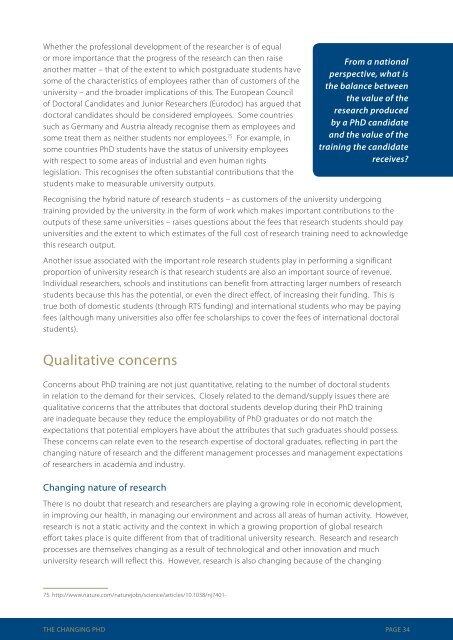the-changing-phd_final
the-changing-phd_final
the-changing-phd_final
Create successful ePaper yourself
Turn your PDF publications into a flip-book with our unique Google optimized e-Paper software.
Whe<strong>the</strong>r <strong>the</strong> professional development of <strong>the</strong> researcher is of equal<br />
or more importance that <strong>the</strong> progress of <strong>the</strong> research can <strong>the</strong>n raise<br />
ano<strong>the</strong>r matter – that of <strong>the</strong> extent to which postgraduate students have<br />
some of <strong>the</strong> characteristics of employees ra<strong>the</strong>r than of customers of <strong>the</strong><br />
university – and <strong>the</strong> broader implications of this. The European Council<br />
of Doctoral Candidates and Junior Researchers (Eurodoc) has argued that<br />
doctoral candidates should be considered employees. Some countries<br />
such as Germany and Austria already recognise <strong>the</strong>m as employees and<br />
some treat <strong>the</strong>m as nei<strong>the</strong>r students nor employees. 75 For example, in<br />
some countries PhD students have <strong>the</strong> status of university employees<br />
with respect to some areas of industrial and even human rights<br />
legislation. This recognises <strong>the</strong> often substantial contributions that <strong>the</strong><br />
students make to measurable university outputs.<br />
From a national<br />
perspective, what is<br />
<strong>the</strong> balance between<br />
<strong>the</strong> value of <strong>the</strong><br />
research produced<br />
by a PhD candidate<br />
and <strong>the</strong> value of <strong>the</strong><br />
training <strong>the</strong> candidate<br />
receives?<br />
Recognising <strong>the</strong> hybrid nature of research students – as customers of <strong>the</strong> university undergoing<br />
training provided by <strong>the</strong> university in <strong>the</strong> form of work which makes important contributions to <strong>the</strong><br />
outputs of <strong>the</strong>se same universities – raises questions about <strong>the</strong> fees that research students should pay<br />
universities and <strong>the</strong> extent to which estimates of <strong>the</strong> full cost of research training need to acknowledge<br />
this research output.<br />
Ano<strong>the</strong>r issue associated with <strong>the</strong> important role research students play in performing a significant<br />
proportion of university research is that research students are also an important source of revenue.<br />
Individual researchers, schools and institutions can benefit from attracting larger numbers of research<br />
students because this has <strong>the</strong> potential, or even <strong>the</strong> direct effect, of increasing <strong>the</strong>ir funding. This is<br />
true both of domestic students (through RTS funding) and international students who may be paying<br />
fees (although many universities also offer fee scholarships to cover <strong>the</strong> fees of international doctoral<br />
students).<br />
Qualitative concerns<br />
Concerns about PhD training are not just quantitative, relating to <strong>the</strong> number of doctoral students<br />
in relation to <strong>the</strong> demand for <strong>the</strong>ir services. Closely related to <strong>the</strong> demand/supply issues <strong>the</strong>re are<br />
qualitative concerns that <strong>the</strong> attributes that doctoral students develop during <strong>the</strong>ir PhD training<br />
are inadequate because <strong>the</strong>y reduce <strong>the</strong> employability of PhD graduates or do not match <strong>the</strong><br />
expectations that potential employers have about <strong>the</strong> attributes that such graduates should possess.<br />
These concerns can relate even to <strong>the</strong> research expertise of doctoral graduates, reflecting in part <strong>the</strong><br />
<strong>changing</strong> nature of research and <strong>the</strong> different management processes and management expectations<br />
of researchers in academia and industry.<br />
Changing nature of research<br />
There is no doubt that research and researchers are playing a growing role in economic development,<br />
in improving our health, in managing our environment and across all areas of human activity. However,<br />
research is not a static activity and <strong>the</strong> context in which a growing proportion of global research<br />
effort takes place is quite different from that of traditional university research. Research and research<br />
processes are <strong>the</strong>mselves <strong>changing</strong> as a result of technological and o<strong>the</strong>r innovation and much<br />
university research will reflect this. However, research is also <strong>changing</strong> because of <strong>the</strong> <strong>changing</strong><br />
75. http://www.nature.com/naturejobs/science/articles/10.1038/nj7401-<br />
THE CHANGING PHD PAGE 34


